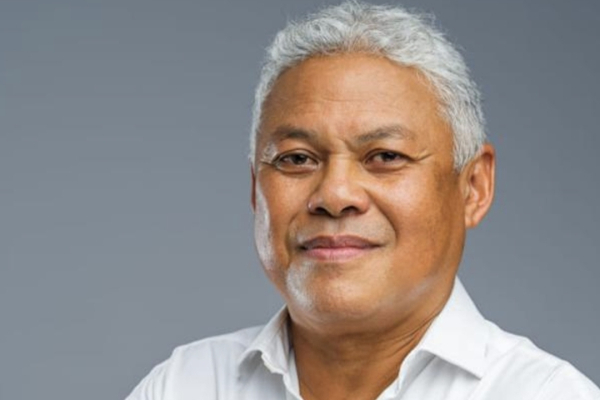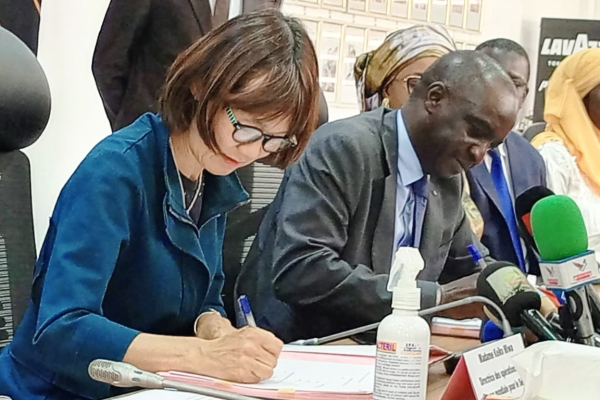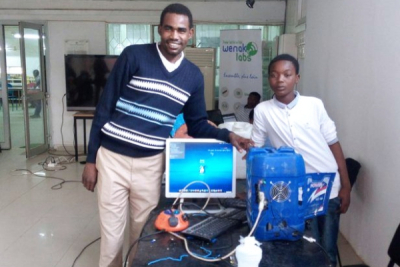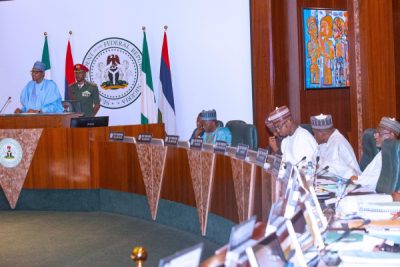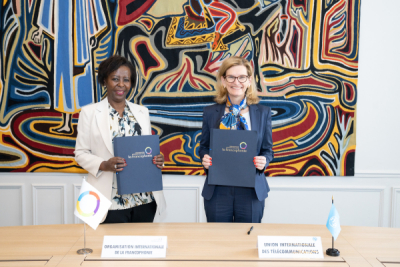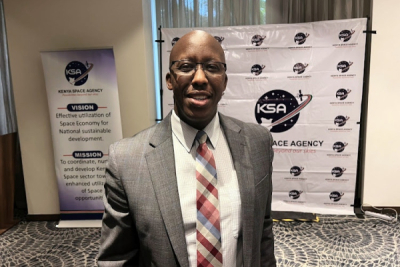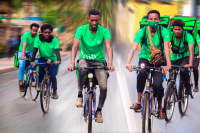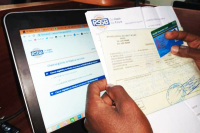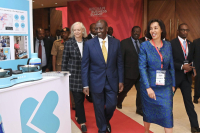The e-commerce industry has grown exponentially in recent years and the number of online marketplaces has followed suit. The marketplaces that were developed in the wake of the e-commerce boom include DizzitUp, an African start-up and finalist of the Ecobank Fintech Challenge 2022. The platform has great ambitions and wants to become the African alternative to Alibaba. During the Lomé chapter of the Africa Fintech Tour, Togo First interviewed its CEO, Solofo Rafeno, to learn more about this marketplace which is getting popular by the day in Benin, Togo, and Madagascar.
Togo First: Could you tell us what DizzitUp is about?
Solofo Rafeno (SR): DizzitUp is an online marketplace that offers African SMEs access to financing solutions to develop their activities. The start-up also helps these businesses increase their revenue by providing an online store that enables them to showcase their products and services to locals and the African diaspora, which is constituted of over 40 million individuals.
DizzitUp is focused on essential goods and services sold exclusively by African companies in 6 categories: food, renewable energy and construction, health, education, tech (phones, computers & internet), and shortly, new decentralized financial services (DeFi).
As a result, DizzitUp enables the digital and financial inclusion of African VSEs/SMEs while bringing them additional revenues.
In 4 months of operation, DizzitUp Marketplace has registered 150 merchants and we plan to exceed 1,000 merchants in Togo, Benin, Madagascar, and Ivory Coast by the end of 2023.
Togo First: What are the main consumer profiles targetted by DizzitUp?
SR: DizzitUp buyers are divided into two main groups: locals that buy for their consumption and members of the African diaspora -more than 40 million individuals- that buy for their relatives based in Togo, Benin and Madagascar to date, and soon in Côte d’Ivoire.
Togo First: How does your marketplace address trust issues?
SR: 80% of the African economy is made up of informal small and medium enterprises (SMEs). To encourage trust between merchants and consumers, one solution is to carefully select merchants, verify them, and focus on essential products and services such as food, self-sufficient solar power equipment, building materials, phones, computers, and health and education services.
DizzitUp field teams verify that the stores have physical addresses and offer products that meet our criteria. We then take pictures and videos and only selected products are posted on our platform.
Also, since logistics is crucial to guaranteeing service quality, our platform offers an extra service: delivery, which is carried out by independent deliverymen.
Togo First: How are the deliveries made?
SR: Our main aim is to always boost the activities of our [registered] merchants. So, we prefer buyers picking their products directly from stores so that the flow of customers can be increased. Package pickup is the default choice but, each merchant can suggest delivery services, which are offered by local DizzitUp partners.
Let’s say for instance that a relative living in Kara buys on the platform and pays using TMoney or Flooz, the beneficiary, a family member in Lome, can come and pick up the goods at the store in Lome or the goods can be delivered by DizzitUp's partner.
Another case is the recurrent purchase of food baskets, "FoodBox", by a Togolese living in New York for his relatives living in Lome. Once the order is paid via Visa or Mastercard, the relatives living in Lome can pick up the goods at the selling store or have them delivered. The merchant is immediately paid by DizzitUp -via TMoney or Flooz or by bank transfer- after the goods are delivered. It should be noted that for any order exceeding CFA30 000, there is free delivery anywhere within the Greater Lome region.
Togo First: You have a Blockchain-based strategy. Do you think that payment methods such as crypto-currencies can be game-changers for marketplaces like yours in Africa?
SR: It is important to note that blockchain is not a payment method in itself, but rather an infrastructure similar to Swift.
Currently, our marketplace accepts Visa and Mastercard international bank cards and mobile money from seven French-speaking countries in West Africa.
We will soon launch our DizzitApp application, based on the Blockchain infrastructure, allowing the diaspora and young urban Africans to pay in Bitcoin and other crypto-currencies knowing that merchants will still be paid in local currency, FCFA, and Ariary for Madagascar. This third means of payment on DizzitApp will allow those with digital assets to use part of their assets to support their families back home with their needs (buying them food, paying school fees and medical procedures, etc.).
Cryptocurrencies are becoming a global medium of exchange with 200-400 million users, including over 40 million in Africa. These people will soon be able to use their cryptocurrency assets to buy essential goods such as food for their consumption or their families in other African countries
Togo First: What do you think of regulations, notably those related to crypto-currency use?
SR: Togo is the second African country with the largest number of crypto-currency users after Nigeria, which represents huge opportunities for the African economy.
Decentralized blockchain networks and associated crypto-currencies are an opportunity for emerging countries. They can allow African countries to accelerate intra-continental trade and facilitate the financial inclusion of VSEs/SMEs and citizens as mobile money services have done for a decade.
But all these new technologies can only be beneficial to businesses and citizens if there is a clearly defined regulatory framework that is regularly amended over time.
Regulators have realized that there is a need for this regulatory framework. We are eagerly expecting them to comply with them to sustain our investments and boost our merchants’ activities.
Togo First: Why did you choose Togo as your base? Do you think that Togo can accelerate the deployment of your startup in the sub-region?
SR: We created our first subsidiary in Togo, which is a real financial hub in the sub-region. We chose to set up here in Togo because the country has a legal infrastructure and a favorable business environment that attracts many financial institutions. The presence of Ecobank's global headquarters in Lomé was also a decisive factor.
Despite our start-up status, they welcomed us into their multinational division. This partnership allowed us to integrate their payment gateway to manage bank cards worldwide and mobile money in 7 countries in the sub-region.
As a result, we were able to create our subsidiary in less than a month, which is an important comparative advantage.
Togo First: You were one of the finalists of the annual competition organized by your partner Ecobank. Was the initial partnership a decisive factor in that selection?
SR: Our partnership with Ecobank was not the decisive factor in our selection in the competition, as other start-ups also had significant partnerships. However, our ambition to expand in 21 countries, of which Ecobank is absent in only two, and our vision and ambition to be an economic player impacting the VSE/SMEs in Africa gave us a definite advantage.
We were one of the six finalists, selected among 700 startups from 59 countries, in the Ecobank Fintech Challenge 2022.
Togo First: You have already raised venture capital funds once. Do you intend to raise additional funds?
SR: Indeed, DizzitUp has already managed to raise $340,000 in funding from 44 individual investors, called "business angels". About a third of these investors are Africans living in Africa or Europe. The funds raised helped develop the start-up and its technology platform over 3 years.
The company is currently planning a second round of $3 million in equity to finance its expansion in Côte d'Ivoire and Nigeria and to develop the new decentralized finance services for VSEs/SMEs merchants of DizzitUp Marketplace.
For this new round, DizzitUp aims to attract private African investors for about 20% of the total amount sought and international investment funds (VCs, international institutions, and corporate funds) for the remaining.
Togo First: What are your future expansion plans?
SR: Regarding our plans, we have decided to strengthen our presence in Madagascar, Togo, and Benin in 2023 and launch a subsidiary in Côte d’Ivoire. We also plan to expand in Nigeria, in 2024, to consolidate our position in West Africa.
I am convinced that Nigeria is not only Africa’s economic driver but also the key to success for a pan-African expansion. No one can claim to be a pan-African company without being present and operational in Nigeria.
Togo First: What are your strategies to achieve those plans?
SR: Our marketplace model is quite simple: purchases are proportional to the number of merchants and products listed. The more offers we have, the more accounts are created, because people can buy what they want. We invest in advertising for merchants and have already made sales in 2022. One of our competitive advantages beyond our decentralized payment infrastructure is our ability to attract merchants by combining digital and on-ground approaches.
We always start with a physical presence approach, deploying teams on the ground to recruit merchants. We also have student recruiters and an incentive system to encourage recruiters, who are also marketing managers for merchants. We provide full free support to merchants, including creating visuals, photos, and videos that we post on Facebook. Recruiters become marketers for our merchants.
Interview by Fiacre E. Kakpo
In recent years, Senegal, like most African countries, has accelerated its digital transformation. To successfully implement that transformation, the country is relying on support from valued partners like the World Bank.
The World Bank recently approved a CFAF91 billion ($150 million) to support Senegal in the implementation of its Digital Economy Acceleration Project (PAEN). A financing agreement was signed to this effect on Thursday, April 6, between Mamadou Moustapha Bâ (photo, right), Senegal's Finance Minister, and Keiko Miwa (photo, left), Director of the World Bank Regional Office for Cape Verde, Gambia, Guinea-Bissau, Mauritania, and Senegal.
"For the population’s benefit, it is essential to leverage digital technologies in critical sectors such as health where digital solutions, including electronic medical records, telemedicine, and immunization campaign management can have a tangible impact," said Keiko Miwa after the agreement was signed.
According to the Finance Minister, the funds will help improve the legal, regulatory, and institutional frameworks governing the digital economy. It will support the digital transformation of the public sector by strengthening the technical foundation and e-government services. It will also promote digital adoption by improving digital literacy and skills -particularly among women and youth- and increasing access to health information to improve the delivery of health services.
PAEN is the first axis of the Plan for an Emerging Senegal (PSE) adopted in 2014 by the government to make Senegal an emerging country by 2035.
Samira Njoya
WenakLabs is a key player in Chad's entrepreneurial ecosystem. By helping innovative technology start-ups succeed, it contributes to the economic and social development of the country while stimulating innovation and creativity.
In the budding Chadian entrepreneurial ecosystem, tech hub WenakLabs is at the vanguard of innovation and creativity. The N’Djamena-based hub offers incubation, mentorship, and financing opportunities to innovative startups and helps individuals and businesses transform their ideas into flourishing companies.
It was born, in 2014, from the collaboration of Chadian bloggers, the French platform Mondoblog, the local network JerryClan Tchad and tech entrepreneur Abdelsalam Safi- who is currently the CEO of WenakLabs. Since then, it has worked closely with local and international partners such as AfriLabs, Oxfam, the French Institute, Moov Africa, Sahel Innov, and UNICEF to provide resources and tools to help Chadian entrepreneurs launch and grow their businesses.
To encourage youth entrepreneurship, WenakLabs provides innovators with a fab lab and a media lab. The fab lab is an open-access digital production space, where digitally controlled machines are made available to the general public for the design and creation of physical objects following an open-space collaborative work model. This place is open to young people who want to acquire skills to quickly transform their ideas into physical prototypes.
The media lab provides an environment for incubatees and project leaders to communicate innovatively and effectively by using new technologies to process, visualize and share information. It also provides a means to disseminate reliable and engaging information to inspire communities to action.
The tech hub claims some 120 startups incubated and 70 projects developed in Chad. Its achievements include ZereSoft, a platform that aims to modernize agriculture and the rural world with 2.0 tools, DaTchad, a data journalism agency project, and Nomad Learning, an SMS-based learning platform.
The incubator regularly organizes programs and events such as the Startup Weekend N'Djamena and DENE MAGIC, a program held in 2022 that aims to provide digital skills to women to bring them closer to decent jobs. WenakLabs also advises, trains, and coaches socioeconomic and digital development actors in the country.
It strives to foster diversity and inclusion in the Chadian entrepreneurial ecosystem. It also promotes equal opportunities for all entrepreneurs, whether they are men or women, novices or experienced, regardless of their social background.
Melchior Koba
Nigeria plays a key role in the African entrepreneurial ecosystem. To consolidate this position, the country is staking resources to further stimulate innovation, create jobs and promote economic growth.
Muhammadu Buhari (photo, left), the outgoing president of the Federal Republic of Nigeria, inaugurated the National Council for Digital Innovation and Entrepreneurship (NCDIE) on Wednesday, April 5.
The NCDIE, chaired by President Buhari, has 13 other members and its mission is to promote the development of the country's digital economy and create an enabling environment for entrepreneurs to flourish.
The council will also oversee the implementation of the Nigeria Startup Act 2022, a law enacted last December to stimulate the growth of innovative startups and small and medium enterprises (SMEs) in the country.
“The law, which was developed as part of a collaborative approach between the Office of the President and the Ministry of Communications and Digital Economy, with support from the technical ecosystem, provides incentives and support to start-ups, such as tax breaks, access to finance, ease of doing business, intellectual property protection and participation in government procurement,” said Muhammadu Buhari.
Nigeria's start-up ecosystem still faces significant challenges such as access to finance and the high cost of creating original products. Despite these obstacles, Nigeria has been at the forefront of startup growth in Africa in recent years with more than $4 billion raised between 2019 and 2022, the president reported.
Thus, the implementation of the Nigeria Startup Act will be an important step in addressing these challenges and promoting the growth and inclusiveness of the national startup ecosystem. According to President Muhammadu Buhari, this will help consolidate and develop the gains made in the digital economy.
Samira Njoya
In recent years, digital tools have proven important for socioeconomic development. However, most African countries are still lagging in terms of digitization, making them unable to capitalize on the opportunities offered by those tools. It is therefore urgent for international partners to support the countries to accelerate digital transformation, therefore facilitating development.
Last Monday, the Secretary General of the International Organization of La Francophonie (IOF), Louise Mushikiwabo (photo, left), and the Secretary General of the International Telecommunication Union (ITU), Doreen Bogdan-Martin (photo, right), signed a Joint Declaration on Cooperation to strengthen the partnership between the IOF and the ITU.
According to the release issued by the IOF, "the actions envisaged through this declaration aim to contribute to ensuring connectivity for all and a sustainable digital transformation. The areas of collaboration taken into account are advocacy for digital connectivity and respect for multilingualism during international consultations and exchanges.”
The declaration also focuses on the acceleration of digital transformation in French-speaking countries, valorization of the expertise of French-speaking professionals, and letting populations -the youth and women notably- get a good grasp of digital issues.
For several months now, the IOF has been multiplying partnerships for the development of the digital sector in French-speaking countries, African countries included. In December, the organization signed a framework cooperation agreement with the West African Development Bank (BOAD) to support digital transformation in WAEMU countries, namely Benin, Burkina Faso, Côte d'Ivoire, Guinea-Bissau, Mali, Niger, Senegal, and Togo.
The declaration is in line with the decisions taken during the last Summit of La Francophonie in Djerba, Tunisia -held on November 19-20, 2022, on the theme "Connectivity in digital diversity as a vector of development and solidarity in the Francophone space"- and the Strategic Plan for the ITU 2024-2027 adopted at the Plenipotentiary Conference held in Bucharest, Romania in October 2022.
Samira Njoya
East African economic powerhouse Kenya is facing its worst drought in decades. With Taifa-1, the country will be able to predict drought-related disasters and speed up the response of emergency programs.
The Kenya Space Agency (KSA) will launch its first operational Earth observation satellite, called Taifa-1, next week, the government announced Monday, April 3.
According to a joint statement from the Ministry of Defense and the Kenya Space Agency, "Taifa-1," or Nation-1 in Swahili, is scheduled to launch on April 10 aboard SpaceX's Falcon 9 rocket from Vandenberg Space Base in California.
According to Hillary Kipkosgey (photo), KSA's director general, "The launch of Taifa-1 is a moment of national pride, because it will play a critical role in decision support in several socioeconomic activities, including environmental monitoring, natural resources management, and agriculture."
Taifa-1 was jointly developed by the University of Nairobi and the Sapienza University of Rome, with launch support provided by the Japan Aerospace Exploration Agency and the United Nations Office for Outer Space Affairs (UNOOSA).
For Hillary Kipkosgey, the satellite will help build the country’s capacities in space, systems engineering, space operations, data processing and analysis, services, and ground station operations.
With the launch of Taifa-1, Kenya joins a very closed circle of African countries that have at least one satellite in the orbit. The first African country to launch its satellite into orbit was Egypt. It was followed by a dozen countries and the continent now has more than 40 satellites in total, according to the platform Space In Africa.
Samira Njoya
In Africa, delivery services have been proliferating in recent years despite addressing issues. The delivery services mostly encountered on the continent use bikes and cars but, in Ethiopia, six tech entrepreneurs have decided to introduce environmentally friendly delivery means.
Tikus Delivery is a digital solution developed by the Ethiopian start-up Avenir Technologies. It allows its users to have meals delivered from various restaurants by bicycle or electric motorcycle. The startup, based in Addis Ababa, was founded in 2019 by Amir Redwan, Bereket Solomon, Bruk Getahun, Tesfa Mesele, and Yasin Aman, to support local restaurants and create jobs for the youth.
“Because bicycles don’t need fuel to operate, Tikus customers can enjoy a lower delivery charge which is 6 ETB ($0.11) per kilometer, and deliveries are made eco-friendly.[...] Bicycles are more affordable than motorbikes, which means more people especially young people can start earning money as Tikus Bikers with a small initial cost,” indicates Amir Redwan.
Through its Android and iOS apps, users can create Tikus accounts and then gain access to the startup's partner restaurants. In a few clicks, they can choose a restaurant to select a menu, validate their orders, and checkout. They will then be delivered in a relatively short time. The apps even give the choice to follow the delivery process in real-time.
The apps automatically calculate the delivery fees based on distance and delivery means chosen. Deliveries by bicycle are charged 25 birrs for the initial kilometer plus 6 birrs for each additional kilometer. The fee for deliveries by bike is 35 birrs for the initial kilometer plus 10 birrs for each extra kilometer.
The Android version of Tikus’ app has been downloaded more than 10,000 times on Playstore. Thanks to support from the Bridges program and Mastercard Foundation, Tikus wants to create a thousand jobs in Ethiopia.
Adoni Conrad Quenum
It is a fast-growing center that offers an environment conducive to innovation, education, and technology. With its modern infrastructure and advanced technologies, Sèmè City is an attractive destination for entrepreneurs, investors, and students.
Sèmè City, located in Benin, is a smart city that aims to become a regional center of excellence in higher education, research, innovation, and economic development.
It was launched, in 2017, by the Beninese government and is being implemented by the Sèmè City Development Agency (ADSC), headed by Claude Borna, an experienced tech and marketing professional. The city is equipped with modern infrastructure, including research laboratories, innovation centers, coworking spaces, conference rooms, housing for students and researchers, and sports and cultural facilities.
Its proposed campus is still under construction but, the city currently operates from four sites. The first site, Sèmè One, is a modern and intelligent campus that includes classrooms, coworking spaces, a language center, offices, and a data center.
The second site, Sèmè Two, is an innovation park designed to promote new research and innovation approaches accessible to every individual above 8 years old. It includes a tool park for digital design and manufacturing and 3D printing, as well as a laboratory to teach X-ray techniques.
The third site, Sèmè Three, created in partnership with UNICEF Benin and UNFPA Benin, is a community center that welcomes young people between the ages of 8 and 18 with workshops and training around themes such as environmental protection, recycling, entrepreneurship, and audiovisual professions.
The last one, called Sèmè Four or Pi, is a building that hosts the reference computer science school Epitech Benin.
Sèmè City regularly hosts events such as the Webinar on "Integrating Open Data and Artificial Intelligence in the Development of Smart Cities in Africa," the Continuing AI Professional Development, and the Summer School organized in partnership with Sorbonne University on the theme "Materials, Innovation, and Sustainable Development" in 2022.
Thanks to the city, the Beninese government plans to create more than 100,000 jobs -half of which will be self-employment and 40% targeting women- by 2032 to become the key partner of innovative projects in strategic areas and to contribute to the achievement of the Sustainable Development Goals (SDGs). The goals are expected to be achieved in collaboration with partners like the World Bank, Isocel, Irex, The Tony Elumelu Foundation, Smart Africa, and UNDP, among others.
Melchior Koba
A few years ago, Rwanda embarked on a massive digital transition that covers every sector.
The Rwanda Social Security Board (RSSB), on Saturday, April 1, launched an innovative digital medical insurance system called RSSB KWIVUZA.
On Twitter, the institution explains that the platform will, among other things, streamline healthcare operations and simplify payment processes. According to Regis Rugemanshuro, CEO of RSSB KWIVUZA, the system was tested extensively during the pilot phase, with positive feedback from the 30 health facilities that were integrated.
Currently, the system covers healthcare mutual services with plans to include the Rwanda Health Insurance (RAMA) and high-level healthcare facilities such as district and provincial hospitals, private hospitals, clinics, polyclinics, and pharmacies, by the end of the year.
RSSB is expected to become the platform where 96% of healthcare mutual invoices are processed since it will be the standard invoicing platform of every healthcare institution. The platform will improve healthcare providers’ payment collection deadline, reducing it to a maximum of 15 days, compared to 80 days previously, which will significantly improve their cash flow and liquidity.
This platform is launched after another one introduced in early February by RSSB to give members an accurate idea of their pension contributions. It is one of the many innovations in the RSSB 2020-2025 strategic plan to transform RSSB into a high-performance, data-driven organization by 2025.
Samira Njoya
With the global development of tech giants like Amazon, Facebook, and Netflix, the importation of digital services has significantly increased in Africa in recent years. To enable every country to benefit from the development, a global tax framework was elaborated. It is expected to become enforceable in January 2024.
Kenya will align its digital tax with the inclusive framework spearheaded by the Organization for Economic Cooperation and Development (OECD). President William Ruto (photo, center) announced this to investors on Thursday, March 30, at the American Chamber of Commerce Regional Business Summit.
“Following discussions with players in this sector, we have committed to review this tax regime and align it with the two-pillar solution currently being developed by the OECD inclusive framework,” President Ruto said.
The OECD finalized the reform of the international tax system aimed at solving tax base erosion and multinationals’ profit-shifting problems. The framework is based on two pillars, the first of which is to align tax rates more closely with local market engagement. To date, 138 jurisdictions have approved it.
Under the former administration, Kenya suspended its support for the global minimum tax rate, which would have seen the government suspend the collection of the digital services tax from tech giants such as Google, Facebook, and Amazon.
At the time, the country expressed its uneasiness with the terms of the agreement that would have seen the end of the digital services tax, which is currently 1.5% of sales made by foreigners in the country. After several negotiations, Kenya finally decided to align itself and sign the pact before its implementation on January 1, 2024.
According to OECD estimates, if Kenya joins, the tax authorities could collect between 3.3 billion shillings ($25 million) and 5.3 billion shillings in taxes, more than 10 times the 400 to 500 million shillings they currently collect each year in digital services tax.
In addition to Kenya, three other countries, namely Nigeria, Pakistan, and Sri Lanka have not yet signed the declaration.
Samira Njoya
More...
Data science and artificial intelligence have improved processes and helped optimize results in several industries. Building on the opportunities they present, some Nigerian tech entrepreneurs decided to put them at the service of agriculture and online commerce.
Zowasel is a digital solution developed by a Nigerian startup. It enables smallholder farmers to use technology to improve their productivity, sustainability, and profitability across the value chain. The Lagos-based agritech startup that launched the solution was founded in 2019 by Jerry Oche and Oghenekome Umuerri. It aims to leverage data science and artificial intelligence to validate and secure the agricultural value chains, from farm to market.
To achieve that goal, it developed an Android app, which enables farmers to access its network of agronomy experts who evaluate productivity and strive to improve crop quality to attract good buyers.
Zowasel also checks buyers’ information such as their creditworthiness before connecting them to farmers. "We match buyers and sellers of the same commodity. [...] You decide on pricing and terms together, Zowasel enforces smart contracts and ensures that all transactions are shipped and payments are made after delivery without any issues," the platform indicates.
In 2021, the agritech startup claimed it was working with more than 1.5 million smallholder farmers in northern Nigeria. That same year, it secured $100,000 in funding from Guinness and Prosimador at the Zero Hunger Sprint 2021, an event held in Lagos and supported by the World Food Programme. Although it has launched operations in the Niger Delta to support smallholder farmers there, expansion outside Nigeria is not yet on its agenda.
Adoni Conrad Quenum
He is a former Deputy Minister of Investment and International Cooperation in Egypt. He is the brain behind several accelerators. He now runs an investment firm and financial services platform that supports fintech startups.
Shehab Marzban (photo) is an Egyptian entrepreneur and investor. He is the co-founder and managing partner of Camel Ventures, the first venture debt and fintech-focused investment firm in Egypt.
The investment firm, founded in 2020, partners with exceptional co-founders to help them build sustainable and high-growth businesses with regional and even global reach. It recently launched a $16 million fund focused on the Egyptian fintech startup ecosystem. The fund is regulated by the Egyptian Financial Regulatory Authority and offers equity investments for early-stage startups and local currency venture loans for later-stage startups.
“The success of the startup relies on the collective strength of all partners and stakeholders. We focus on our deep local knowledge, regulatory and business expertise, as well as our global outreach and network to support local champions while strengthening their growth on a regional and global level,” Camel Ventures said when announcing the VC fund.
Its managing partner, Shehab Marzban, graduated from Cairo University with a Master's in Operations Research and Decision Support in 2004. He received his Ph.D. in Information Systems and Operations Research from the University of Cologne in 2008 and did postdoctoral research in Islamic Economics and Finance at Durham University between 2009 and 2012. In 2015, he completed an executive program in venture capital at the Haas School of Business at the University of California, Berkeley.
In 2021, he founded Digital Finance Holding (DFin), a financial services platform that supports and promotes financial technology (fintech) companies in the non-bank financial services sector.
In 2012, he founded the crowdfunding company Shekra to support the education, legality, funding, mentoring, and monitoring processes of startups. In 2017, he also founded the entrepreneurship center Fekretak Sherketak, the investment company Egypt Ventures, and the accelerator EFG EV Fintech that focuses on fintech startups.
Formerly an external consultant on venture capital, micro, small and medium enterprises, and Islamic finance at the World Bank Group (2013-2015), he worked at Egypt's Ministry of Investment and International Cooperation for 4 years. First appointed as a senior economic advisor to the minister in 2015, he later held the positions of deputy minister and chief advisor to the minister there.
Melchior Koba
In 2019, the Moroccan government launched a national strategy to improve financial inclusion across the country. To achieve the objectives set in that strategy, the executives are working with public and private partners.
Last Friday, the World Bank’s board of directors approved a third Development Policy Loan (DPL) of $450 million for Morocco.
According to an IMF release dated April 3, 2023, this DPL aims to support the Moroccan government in the implementation of reforms to improve financial inclusion, digital entrepreneurship, and individuals and businesses’ access to infrastructure and digital services.
“This third financing is in line with the recommendations of the New Development Model (NDM), which emphasizes the need for a paradigm shift to promote inclusive, private sector-led growth to improve public services and reduce social and spatial disparities,” indicated Jesko Hentschel, Country Director for the Maghreb and Malta at the World Bank.
The first DPL, amounting to $500 million, was approved in 2020. In June 2021, a second one -$450 million- was approved. Combined with the new one, the total DPL secured by Morocco amounts to $1.4 billion.
It is a continuation of the $700 million financing the World Bank approved, in 2019, to support financial inclusion and the digital economy in Morocco.
The various funding enabled Morocco to significantly push back the barriers to financial and digital inclusion. Today, 44% of Moroccans have a bank account compared to 29% in 2017, and 30% of them use digital payments compared to 17% in 2017, the IMF release reported.
“The infrastructure for digital payments has expanded with 31% of rural districts now covered by mobile payment networks and 19 mobile payment providers in operation,” the IMF indicates.
Samira Njoya
Government-owned postal company SOPECO wants to become a leading player in the digitization of the country’s services. To achieve that goal, it is joining forces with technology partners specialized in the field.
The Indian group ATDXT will support the Congolese Posts and Savings Company (SOPECO) in the digitization of its activities. A partnership agreement was signed, Thursday, March 29, to this effect between the two companies to create a digital finance platform promoting savings and microlending.
"We aim to popularize these inclusive products that range from digital savings and wallets to micro-loans, through a digital platform [that can be used from] a telephone. This will allow consumers to for instance make purchases without using cash and resell services, generating additional income to sustain their business,” said Ludovique Mbossa (photo, right), SOPECO’s general manager.
Thanks to that agreement, SOPECO joins the Senegalese and Djiboutian state postal companies that have already taken steps to digitize their activities. Under that deal, a digital savings platform, "Nova digitale", will be set up for SOPECO to improve financial inclusion by promoting access to financing for individuals and SMEs that are still left behind.
This partnership comes four months after the agreement signed between the Indian group ATDXT and the Congolese Minister of Digital Economy, Léon Juste Ibombo, to support the country in the realization of several projects, the most important of which is the digitization of SOPECO.
Samira Njoya


